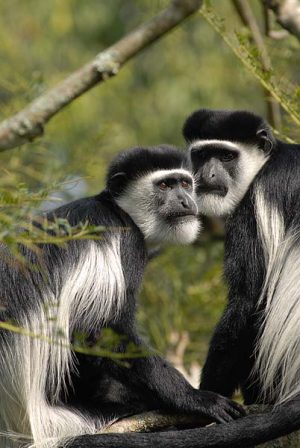
It therefore comes as no surprise that Bwindi was named one of Africa’s most interesting national parks of 2014. Most of the birding in Bwindi takes place along the main trail, the Buhoma Waterfall Trail. Look out for the White-tailed Ant Thrush and handsome francolin feeding on the track at dawn, the dazzling Black Bee-eater, Yellow-eyed Black and African Sooty Flycatchers along the bamboo zone and Mubwindi Swamp trail in Ruhija which provides fine montane forest with micro habitats in form of second growth vegetation where sightings of the endemic and localized African green broadbill are frequent.
It is this altitudinal variation, combined with its location along the Albertine rift that results in Bwindi Impenetrable being the richest forest in East Africa in terms of its trees, butterflies and birds (163species of trees, 120species of butterflies and 350species of birds respectively).
Bwindi impenetrable forest has ideal habitat for a variety of birds including 23 endemics (90% of all Albertine Rift endemics) such as the Short-tailed Warbler and Blue-headed Sunbird as well as seven IUCN red data listed species such as the African Green Broadbill and Shelley’s Crimsonwing.
For Accommodation in Bwindi, Make Nkuringo Mountain Gorilla Lodge your first choice to get an early start birding in Bwindi that offers the best chance of finding the striking Handsome Francolin. Easy to see are the cinnamon-chested bee-eaters, African Emerald Cuckoo, Common Bulbul, African Blue and White-tailed Blue Flycatchers, Black bee-eater, Western green tinker bird, Bar-tailed trogon, red-headed Bluebill and yellow white eye that hand out at the Gorilla Lodge‘s compound. Look out for the Western Green Tinkerbird, Mountain and yellow-streaked bulbuls, Mountain Masked and Chestnut-throated Apalis, Red-faced Woodland Warbler, the attractive White browed crombec, Rwenzori Batis and White-tailed Crested Flycatcher. African Hill Babbler, collard Apalis, Banded Prinia and montane Sooty Boubou favour tangles of creepers along forest edges, a habitat shared with the enigmatic Grauer’s Warbler and Scaly-throated Honeyguide.
